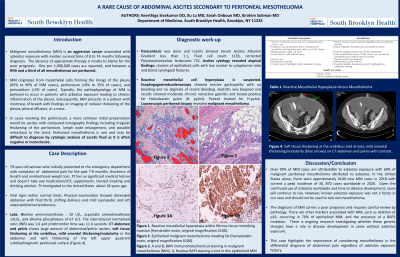Monday Poster Session
Category: Stomach
P2826 - A Rare Cause of Abdominal Ascites Secondary to Peritoneal Mesothelioma
Monday, October 23, 2023
10:30 AM - 4:15 PM PT
Location: Exhibit Hall

- KS
Keerthiga Sivakumar, DO
South Brooklyn Health
Brooklyn, NY
Presenting Author(s)
Keerthiga Sivakumar, DO, Xu Lu, MD, Onobun Moyosoreoluwa, MD, Ibrahim Soliman, MD
South Brooklyn Health, Brooklyn, NY
Introduction: Malignant mesothelioma (MM) is an aggressive cancer associated with asbestos exposure with median survival time of 8 to 14 months following diagnosis. Peritoneal mesothelioma is rare and may be difficult to diagnose by cytologic analysis of ascetic fluid as it is often negative or inconclusive. MM is a rare cancer originating from mesothelial cells forming the linings of the pleura, (most cases), peritoneum, and pericardium. Patients do not present until symptoms appear, at which point it is too late, which is one of the reasons for the poor prognosis.
Case Description/Methods: 79-year-old woman who initially presented to the emergency department with complaints of presented with abdominal pain for the past 7-8 months, shortness of breath and unintentional weight loss. Pt is from Russia, has no family in the United States, and immigrated about 18 years ago. Physical examination showed a distended abdomen with fluid thrill, sifting dullness and mild suprapubic and left-sided abdominal tenderness. CT abdomen and pelvis showed large amount of abdominal/pelvic ascites, mild omental thickening/nodularity in the abdomen, and thickening of the left upper quadrant subdiaphragmatic peritoneal surface. Paracentesis was done and results showed Serum Ascites Albumin Gradient less than 1.1, Fluid cell count 1133, and corrected Polymorphonuclear leukocytes 732. Ascites cytology revealed atypical findings: clusters of epithelioid cells with low nuclear to cytoplasmic ratio and bland cytological features. Reactive mesothelial cell hyperplasia is suspected. Esophagogastroduodenoscopy showed erosive gastropathy with no bleeding and no stigmata of recent bleeding. Gastritis was biopsied and results showed moderate chronic nonactive gastritis and tested positive for Helicobacter pylori (H. pylori). Patient was treated for H-pylori. Laparoscopic peritoneal biopsy revealed malignant mesothelioma.
Discussion: Over 90% of MM cases are attributable to asbestos exposure with 60% of malignant peritoneal mesothelioma attributed to asbestos. Known asbestos exposure was not a factor in our case and should not be used to rule out mesothelioma. The diagnosis of MM carries a poor prognosis and requires careful review by pathology. There is ongoing research investigating whether these genetic changes have a role in disease development in cases without asbestos exposure. This case highlights the importance of considering mesothelioma in the differential diagnosis of abdominal pain regardless of asbestos exposure history.

Disclosures:
Keerthiga Sivakumar, DO, Xu Lu, MD, Onobun Moyosoreoluwa, MD, Ibrahim Soliman, MD. P2826 - A Rare Cause of Abdominal Ascites Secondary to Peritoneal Mesothelioma, ACG 2023 Annual Scientific Meeting Abstracts. Vancouver, BC, Canada: American College of Gastroenterology.
South Brooklyn Health, Brooklyn, NY
Introduction: Malignant mesothelioma (MM) is an aggressive cancer associated with asbestos exposure with median survival time of 8 to 14 months following diagnosis. Peritoneal mesothelioma is rare and may be difficult to diagnose by cytologic analysis of ascetic fluid as it is often negative or inconclusive. MM is a rare cancer originating from mesothelial cells forming the linings of the pleura, (most cases), peritoneum, and pericardium. Patients do not present until symptoms appear, at which point it is too late, which is one of the reasons for the poor prognosis.
Case Description/Methods: 79-year-old woman who initially presented to the emergency department with complaints of presented with abdominal pain for the past 7-8 months, shortness of breath and unintentional weight loss. Pt is from Russia, has no family in the United States, and immigrated about 18 years ago. Physical examination showed a distended abdomen with fluid thrill, sifting dullness and mild suprapubic and left-sided abdominal tenderness. CT abdomen and pelvis showed large amount of abdominal/pelvic ascites, mild omental thickening/nodularity in the abdomen, and thickening of the left upper quadrant subdiaphragmatic peritoneal surface. Paracentesis was done and results showed Serum Ascites Albumin Gradient less than 1.1, Fluid cell count 1133, and corrected Polymorphonuclear leukocytes 732. Ascites cytology revealed atypical findings: clusters of epithelioid cells with low nuclear to cytoplasmic ratio and bland cytological features. Reactive mesothelial cell hyperplasia is suspected. Esophagogastroduodenoscopy showed erosive gastropathy with no bleeding and no stigmata of recent bleeding. Gastritis was biopsied and results showed moderate chronic nonactive gastritis and tested positive for Helicobacter pylori (H. pylori). Patient was treated for H-pylori. Laparoscopic peritoneal biopsy revealed malignant mesothelioma.
Discussion: Over 90% of MM cases are attributable to asbestos exposure with 60% of malignant peritoneal mesothelioma attributed to asbestos. Known asbestos exposure was not a factor in our case and should not be used to rule out mesothelioma. The diagnosis of MM carries a poor prognosis and requires careful review by pathology. There is ongoing research investigating whether these genetic changes have a role in disease development in cases without asbestos exposure. This case highlights the importance of considering mesothelioma in the differential diagnosis of abdominal pain regardless of asbestos exposure history.

Figure: Soft tissue thickening at the umbilicus (red arrow), mild omental thickening/nodularity (blue arrows) on CT abdomen and pelvis with contrast
Disclosures:
Keerthiga Sivakumar indicated no relevant financial relationships.
Xu Lu indicated no relevant financial relationships.
Onobun Moyosoreoluwa indicated no relevant financial relationships.
Ibrahim Soliman indicated no relevant financial relationships.
Keerthiga Sivakumar, DO, Xu Lu, MD, Onobun Moyosoreoluwa, MD, Ibrahim Soliman, MD. P2826 - A Rare Cause of Abdominal Ascites Secondary to Peritoneal Mesothelioma, ACG 2023 Annual Scientific Meeting Abstracts. Vancouver, BC, Canada: American College of Gastroenterology.
